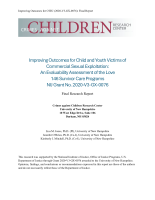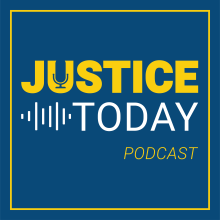Policy makers
Human Trafficking Data Project
Plight of the Indigent Accused in America - An Examination of Alternative Models for Providing Criminal Defense Services to the Poor, Volume 2 - Policy-Makers' Report
Issues in Contracting for the Private Operation of Prisons and Jails
Minnesota Community Corrections Act Evaluation - General Report
PRIPARE: Parole and Reduced Incarceration for People thru Access to Re-Entry
Improving Outcomes for Child and Youth Victims of Commercial Sexual Exploitation: An Evaluability Assessment of the Love 146 Survivor Care Programs
Celebrating 10 Years of NIJ’s Law Enforcement Advancing Data and Science (LEADS) Scholars Program - 2024 NIJ Research Conference
In 2014, NIJ established the Law Enforcement Advancing Data and Science (LEADS) Scholars Program to support research-minded, mid-career sworn law enforcement officers working to integrate research into agency policy and practice. The LEADS Scholars Program helps participants develop independent research and provides support to identify current evidence on priority issues.
See the YouTube Terms of Service and Google Privacy Policy
The Consequences and Impacts of Hate Crime and Post-Victimization Experiences: The Longitudinal Hate Crime Victimization Survey (LHCVS)
Persistence and Desistance across Generations: A Longitudinal Investigation
Learning from an Implementation and Outcome Evaluation of the Colorado Threat Assessment and Management Protocol
Expansion of University of South Florida's BRIGHT Project to Combat Human Trafficking
Just Science Podcast: Just Public Health and Safety Data Sharing in Georgia
Navigating Medical Examiner And Coroner Office Accreditation Challenges: A Practical Guide
Webinar Transcript: NIJ FY 2024 Research and Evaluation on School Safety
This webinar provided information on the NIJ FY 2024 Research and Evaluation on School Safety solicitation. In collaboration with BJA, this solicitation will seek applications for rigorous research and evaluation projects to fill knowledge gaps in two topical areas:
- Studies on the root causes and consequences of school...
How Much Difference Does the Lawyer Make? The Effect of Defense Counsel on Murder Case Outcomes
What's Known and Unknown about Marijuana, Part 2
Marijuana legalization poses many challenges — especially those related to drug chemistry and toxicology — for researchers, law enforcement, and policy makers. In the latest episode of Justice Today, NIJ Communications Assistant Josh Mondoro hosts a conversation with NIJ Scientist Frances Scott about marijuana toxicology, including comparing its effects to alcohol, measuring impairment, and maintaining public safety as more and more states legalize recreational marijuana.
The Implications of Stress Among Correctional Officers: A Summary of the Risks and Promising Intervention Strategies
What's Known and Unknown about Marijuana
What's Known and Unknown about Marijuana, Part 1
Marijuana poses many challenges for researchers, law enforcement, and policy makers, challenges that fall into two fields: drug chemistry and toxicology. NIJ scientist Dr. Frances Scott joins this episode to explain the complications in drug chemistry and how difficulties defining marijuana lead to backlogs in crime labs around the country. NIJ Communications Assistant Josh Mondoro hosts.





